Sheer Magic

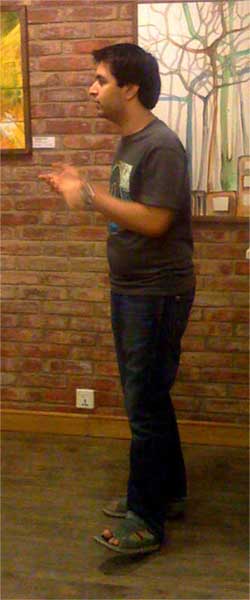
Labels: Apple, Events, Media, News, Pakistan, Reviews, Science, T2F, Technology
This blog is best viewed with the latest browser and an open mind!


Labels: Apple, Events, Media, News, Pakistan, Reviews, Science, T2F, Technology
A few days ago I received an article (Two Nations, Two Choices by Vir Sanghvi, written sometimes in January 2008). Forwarded by an expat friend in the US, the Subject line of the mail was "Sad, but worth reading".
Many Muslims have been surprised and even hurt at the article written by Vir Sanghvi in the Counterpoint column of Hindustan Times on Sunday, which is without doubt the most read column of any editor in India. The reason is obvious. Had it been written by any other person it would not have mattered that much but Vir Sanghvi is one of the best editors, an erudite and highly respected journalist. Like many others he also puts the onus on Muslims for not condemning fundamentalism of Muslims ... Muslims don’t remain silent and do condemn but our voices don’t reach you. The Delhi-centric (Delhi/Haryana/Punjab) papers never carry these stories. In small cities all over Northen India Muslims protest and raise voice, but who takes notice!
Labels: Bloggers, Media, News, Pakistan, People, Politics, Religion, Reviews
... I'd have switched to FSMism and become a Pastafarian. Yes, that's not a typo. I said Pastafarian!
... [S]houldn't we endeavor to give scientists the largest collection of tools possible? No one is saying that they have to apply a supernatural explanation to any particular phenomenon. Only that the supernatural be available if nothing else works, or if it is convenient for deceptive political purposes. And remember, this is not a radical new idea. In terms of years in use, supernatural science - SuperScience if you will - has the edge on conventional science. Conventional, or empirical, science has been in use for only a few hundred years. Obviously there must be a reason supernatural science lasted so long, before this empirical-science fad began. Could it be that supernatural science is more productive than empirical science?For those skeptics demanding evidence in support of such a seemingly outlandish assumption, the Gospel offers many examples. Here's one!
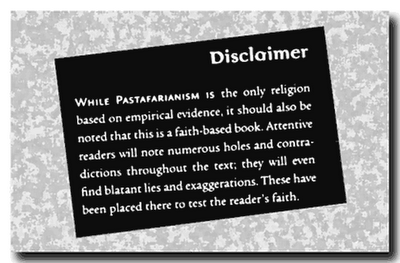
Labels: Books, Literature, Personal, Politics, Religion, Reviews, Science

When I got back from a week-long trip to India last Monday, I planned to write several posts about the trip, but a bout of food-poisoning (caught here ... and furthering my resolve to stay away from 5-Star Cuisine) has laid me low. So, until I am back in action - in a couple of days at most - I thought I'd share a particularly delightful piece from the Guardian.
Wednesday July 23 2008
Chaps,
I am mightily pissed off. I have addressed this to Owen, Amanda and Ben because I don't know who I am supposed to be pissed off with (I'm assuming Owen, but I filed to Amanda and Ben, so it's only fair), and also to Tony, who wasn't here - if he had been I'm guessing it wouldn't have happened.
I don't really like people tinkering with my copy for the sake of tinkering. I do not enjoy the suggestion that you have a better ear or eye for how I want my words to read than I do. Owen, we discussed your turning three of my long sentences into six short ones in a single piece, and how that wasn't going to happen anymore, so I'm really hoping it wasn't you that fucked up my review on Saturday.
It was the final sentence. Final sentences are very, very important. A piece builds to them, they are the little jingle that the reader takes with him into the weekend.
I wrote: "I can't think of a nicer place to sit this spring over a glass of rosé and watch the boys and girls in the street outside smiling gaily to each other, and wondering where to go for a nosh."
It appeared as: "I can't think of a nicer place to sit this spring over a glass of rosé and watch the boys and girls in the street outside smiling gaily to each other, and wondering where to go for nosh."
There is no length issue. This is someone thinking "I'll just remove this indefinite article because Coren is an illiterate cunt and I know best". Well, you fucking don't.
This was shit, shit sub-editing for three reasons.
1) 'Nosh', as I'm sure you fluent Yiddish speakers know, is a noun formed from a bastardization of the German 'naschen'. It is a verb, and can be construed into two distinct nouns. One, 'nosh', means simply 'food'. You have decided that this is what I meant and removed the 'a'. I am insulted enough that you think you have a better ear for English than me. But a better ear for Yiddish? I doubt it. Because the other noun, 'nosh' means "a session of eating" - in this sense you might think of its dual valency as being similar to that of 'scoff'. You can go for a scoff. or you can buy some scoff. The sentence you left me with is shit, and is not what I meant. Why would you change a sentence so that it meant something I didn't mean? I don't know, but you risk doing it every time you change something. And the way you avoid this kind of fuck up is by not changing a word of my copy without asking me, okay? it's easy. Not. A. Word. Ever.
2) I will now explain why your error is even more shit than it looks. You see, I was making a joke. I do that sometimes. I have set up the street as "sexually-charged". I have described the shenanigans across the road at G.A.Y. I have used the word 'gaily' as a gentle nudge. And "looking for a nosh" has a secondary meaning of looking for a blowjob. Not specifically gay, for this is Soho, and there are plenty of girls there who take money for noshing boys. "Looking for nosh" does not have that ambiguity. The joke is gone. I only wrote that sodding paragraph to make that joke. And you've fucking stripped it out like a pissed Irish plasterer restoring a renaissance fresco and thinking Jesus looks shit with a bear so plastering over it. You might as well have removed the whole paragraph. I mean, fucking christ, don't you read the copy?
3) And worst of all. Dumbest, deafest, shittiest of all, you have removed the unstressed 'a' so that the stress that should have fallen on "nosh" is lost, and my piece ends on an unstressed syllable. When you're winding up a piece of prose, metre is crucial. Can't you hear? Can't you hear that it is wrong? It's not fucking rocket science. It's fucking pre-GCSE scansion. I have written 350 restaurant reviews for The Times and I have never ended on an unstressed syllable. Fuck. fuck, fuck, fuck.
I am sorry if this looks petty (last time I mailed a Times sub about the change of a single word I got in all sorts of trouble) but I care deeply about my work and I hate to have it fucked up by shit subbing. I have been away, you've been subbing Joe and Hugo and maybe they just file and fuck off and think "hey ho, it's tomorrow's fish and chips" - well, not me. I woke up at three in the morning on Sunday and fucking lay there, furious, for two hours. Weird, maybe. But that's how it is. It strips me of all confidence in writing for the magazine. No exaggeration. I've got a review to write this morning and I really don't feel like doing it, for fear that some nuance is going to be removed from the final line, the pay-off, and I'm going to have another weekend ruined for me.
I've been writing for The Times for 15 years and I have never asked this before - I have never asked it of anyone I have written for - but I must insist, from now on, that I am sent a proof of every review I do, in PDF format, so I can check it for fuck-ups. And I must be sent it in good time in case changes are needed. It is the only way I can carry on in the job.
And, just out of interest, I'd like whoever made that change to email me and tell me why. Tell me the exact reasoning which led you to remove that word from my copy.
Right ... Sorry to go on. Anger, real steaming fucking anger, can make a man verbose.
All the best.
Giles
guardian.co.uk © Guardian News and Media Limited 2000
Labels: Bloggers, Education, Literature, Media, Personal, Reviews, Yooñhee
While I sort of pride myself on not just how accepting I am of change but on how much I try and do to add to its pace, I admit to being guilty of conservatism when it comes to certain matters. Among them, are the writing standards that I expect from newspapers. Lately, the quality of writing, as of everything else, has become so bad that it has added to the reasons which have weaned me away from the habit of starting the day with the morning edition of The Daily Yawn.
Labels: Education, Media, Music, News, Pakistan, Rant, Reviews
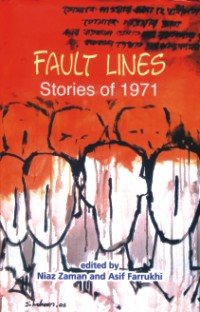 Prof. Niaz Zaman (of Dhaka) and the multifaceted Asif Farrukhi (of Karachi) have jointly edited Fault Lines, a book of excellent short stories centred around 1971. Many of these stories were translated from Bengali, Hindi, and Urdu into English for this publication from Bangladesh, now available at T2F courtesy OUP.
Prof. Niaz Zaman (of Dhaka) and the multifaceted Asif Farrukhi (of Karachi) have jointly edited Fault Lines, a book of excellent short stories centred around 1971. Many of these stories were translated from Bengali, Hindi, and Urdu into English for this publication from Bangladesh, now available at T2F courtesy OUP."Baby, there's blood on your finger. Did you hurt yourself?""No ... I did not hurt myself", the little girl says."Okay, but let me wash it away.""NO! I won't let you wash it! It's my mother's blood."
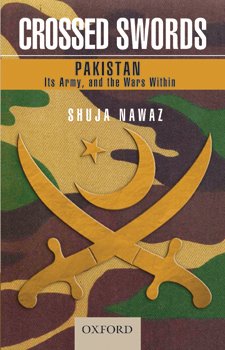 A seasoned journalist and member of several Think Tanks in the USA, where he lives, Shuja Nawaz has recently authored Crossed Swords — Pakistan, its Army and the Wars Within, a book that is making waves everywhere even before the launch. Internationally, leading publications are showing exceptional interest in talking to him and in reprinting extracts from the book. A big launch is scheduled in Delhi soon. In Pakistan, the media is battling for time with him to conduct one-to-one interviews during the 2 days he is in Karachi.
A seasoned journalist and member of several Think Tanks in the USA, where he lives, Shuja Nawaz has recently authored Crossed Swords — Pakistan, its Army and the Wars Within, a book that is making waves everywhere even before the launch. Internationally, leading publications are showing exceptional interest in talking to him and in reprinting extracts from the book. A big launch is scheduled in Delhi soon. In Pakistan, the media is battling for time with him to conduct one-to-one interviews during the 2 days he is in Karachi.Labels: Bloggers, Books, Education, Literature, Media, Pakistan, People, Politics, Reviews, T2F
... aur voh bhee mara hua!
* ("Don't they all look so-o-o alike? How can one tell?" - a Chinese shipmate had once asked me when I had pointed out the the 'Englishman' he was talking to was, in fact, a Yugoslav and understood no English!)Even the peaceful among Muslims who are angered by this film - and there is reason enough for many to be angered by the intent if not the content - could respond by putting up links to videos related to Jesus Camp - now there's a frightening scenario to match our choice madrassahs. But what would such mud-slinging achieve, other than further dividing people from each other? Some globalization!
Labels: Bloggers, Media, News, Pakistan, People, Politics, Religion, Reviews, Urdu
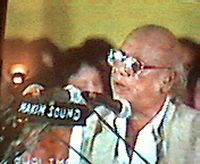 The Habib Jalib evening at T2F was not quite what I'd expected it to be. No, it wasn't bad. Everyone else seems to have enjoyed it a lot, with many people discovering him anew and suddenly wanting to get hold of ATJ (to use Adil Najam's tarkeeb).
The Habib Jalib evening at T2F was not quite what I'd expected it to be. No, it wasn't bad. Everyone else seems to have enjoyed it a lot, with many people discovering him anew and suddenly wanting to get hold of ATJ (to use Adil Najam's tarkeeb).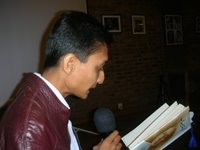 The session ended with Shaeri's answer to Zakir Naik - Wajid Jawad, blogger Jamash (left), and myself reciting selections.
The session ended with Shaeri's answer to Zakir Naik - Wajid Jawad, blogger Jamash (left), and myself reciting selections.Labels: Activism, Bloggers, Books, Events, Literature, Media, Music, Pakistan, People, Personal, Poetry, Politics, Reviews, T2F, Urdu
The wedding ceremony shows a spanning shot of the guests. Since the hero is (if I recall right) a character from Lollywood, he has invited hordes of stars as guest. Thus, the shot features a dazzling array of cameo appearances by any stars that were left out of an already star-studded movie. Name him or her - and you could catch a glimpse among the seated guests. (The people in the movie hall were outdoing each other at shouting out the names as the stars appeared.)Back to reality!
Unlike the usual style of movies then (has it changed much, I wonder), where everyone breaks into an aria, or prances about in the mistaken belief that s/he is dancing, at every opportunity - here was an occasion that actually demanded a song and dance sequence. The decorated stage came into view and two of our greatest classical singers, Nazakat & Salamat performed a superb long piece to the accompaniment of India's great Tabla player, Ustad Allah Rakha. Yes, things were different then. But not too different. The authorities decided that they'd not allow the visuals to feature him so (I think) we probably had pans and other shots while he played. EMI did release the brilliant solo, one that seamlessly bridged the Nazakat-Salamat performance and what followed, as a separate recording!
So what did follow? To the brilliant tabla sound that remained after the classical duo had ended was added the sound of ghungroos ... and from the stage wings, to the cheers of the people in the hall, appeared the two most popular dancers of the time, Amy Minwalla (whom I remember as a lissome lil girl - a far cry from her later appearances - at my first Christmas party in Karachi, at Hotel Metrople, where she performed a Ballet!) and the alluring Panna, the real-world wife of Director Sulaiman. In a well-choreographed dance sequence, they lip-sync'd to two playback singers singing Sajan Laagi Toree Lagan Sajna: Farida Khanum and Madam Noor Jehan!
Could any Pakistani filmgoer, then or now, ask for a better treat?
Labels: Art, Media, Music, Pakistan, People, Poetry, Reviews, Urdu
You may believe that the present is the key to the past, but what if The Present has been 'created' as is, and there is no such thing as The Past?
Evolution is not the only misleading theory under attack by the people at ICR, which claims that its "articles are written by top professionals in the fields of geology and biology."The Appearance of Age at CreationAt the marriage feast in Cana (John 2:1-11) Jesus commanded servants to take huge water pots and fill them with water. He then told the servants to draw from the pots and take it to the Ruler of the Feast, who deemed it excellent wine. However, the Ruler of the Feast had used the assumption that the present is the key to the past! He used his own reasoning based on what he knew happens in the present. He assumed, based on everyday experience, this wine had come from grapes grown on vines, grapes that had been harvested and crushed, fermented, and bottled. He thought it had taken a long period of time, but he was wrong. Jesus had, in fact, created this wine. This then is the characteristic of anything God does in creation. From our experience it has an apparent age, an appearance of a non-existent history. And why did Jesus do this? He did it to meet an immediate need.
When God commanded the fruit trees into existence He created them already bearing fruit. If we went back in time, we would have looked at those trees and would have said that they had taken years to grow and mature. But God created a mature, fully-developed creation, because it was meant to be in existence immediately so that when Adam and Eve walked the earth three days later, their food needs would be met.
What do many people say today? They say the world "looks old," therefore the Bible is wrong or God has deceived us. No, God has not deceived us, because He told us what happened in His eyewitness account in Genesis 1. God saw what He made and said it was very good. He was present. He was fully capable of recording and preserving for us His eyewitness account so we would know what happened at creation with absolute certainty. The Gospel accounts give Jesus' stamp of approval on Genesis 1 as the historical record of the earth's beginning. God's timetable for the creation was that He spoke the earth into existence.
Yes, the earth has an appearance of age. But if we use the wrong assumptions to interpret the evidence, we come to the wrong conclusion that the earth is very old, when God clearly says it isn't.
Labels: Books, Education, Environment, Media, People, Politics, Religion, Reviews, Science
Don't blame me. YOU asked for it!
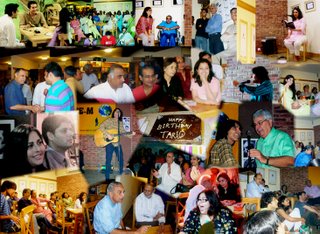
Read only if you're past 60:Tammy Haq of Business Plus was, obviously, bowled over by Tee-M's performance (which, by the way, is part of T2F's Visitor's Nights, an occasional event that will host interesting people dropping into Karachi). So, Tammy decided to hold a TV Special that was shot at T2F, soon after. Sabeen was interviewed on the program, too. While the evening was enjoyable, the 'shoot' certainly took away from the spontaneity of Tee-M's first performance and those who only caught the latter on TV have no idea what fun his first T2F night was like.
Naeem - an old schoolmate - used to be among the best voices of our younger days and I still recall him and Adlynne Afzal's duet of A- You're Adorable on a Radio Pakistan(!) Show, where another friend, Ifti, also sang Granada in his beautiful baritone the same evening. (Bet you, Naeem, that you'd forgotten this yourself!).
Those were the days of Western Music programmes on Radio Pakistan! Hit Parades in the afternoons. Music Requests at night, with 'dedications' that often led to disasters - as Dr Irfan Mirza would know if he reads this. Still ringing in my mind are the popular voices of announcers-cum-newsreaders, Edward Carapiett and Khadija Naqvi.
Wonder if we can get some of the old folks together at T2F: Louis D'Cruz - known for his Country & Western bits - and Austin Freitas for some Operatic arias. Can anyone recall others and help?
Following up on the story, someone has suggested a whole evening dedicated to discussing the Kari scourge, its origins, and what can be done to stop it. Is anyone interested in taking this up and organising it at T2F???On request, Bina next read her recent US Visa piece and, once again, had the audience in stitches. There's a review on KMB of her evening by Jamash (whose lovely photo of Bina is worth a dekko).
Labels: Activism, Bloggers, Books, Education, Events, Literature, Music, People, Personal, Poetry, Reviews, T2F, Urdu
Before approaching the contents of the book, itself, I need to take one paragraph to point out that the absence of an Index in such a work (or the absence of Footnotes on the poor excuse of their being disruptive in the flow of the narrative) makes citation or quoting, and the verifications of 'facts', very difficult. Although there is a printer-friendly notes section, divided by chapters, on the net, there is no way to find out whether the specific portion one wishes to check up on has been addressed through a notation or not. For example, in the prologue Prophet Mohammad is quoted as having defined religion as 'the way we conduct ourselves towards others'. I wanted to know which Hadith or source Ms Manji got this from (I was sure she did not make this up - but I needed a reference for some other reason). So: shut the book; get up from the chair I am cuddled in; get to the computer in another room; open Browser; get to her website (luckily bookmarked); link to the 'sources' section; click 'Prologue'. Oops! No references. The 3 that are there, deal with matters I would have found no reason to check up on. Even armed for the future, with printouts that avoid the 'delay', this kind of referencing is a poor, if not outright useless idea. And what do the numbers in these reference sections denote, anyway, since no corresponding numbers are found in the text?
An aside: My own encounter with a priest's wrath came after I brought up the likelihood of the Bible being written by polytheists and mythologists as I felt by reading this:
And it came to pass, when men began to multiply on the face of the earth, and daughters were born unto them, that the sons of God saw the daughters of men that they were fair; and they took them wives of all which they chose. And the LORD said, My spirit shall not always strive with man, for that he also is flesh: yet his days shall be an hundred and twenty years. There were giants in the earth in those days; and also after that, when the sons of God came in unto the daughters of men, and they bare children to them, the same became mighty men which were of old, men of renown. (Genesis 6:1-4)
I got hit even before I had time to question why most humans did not (despite God's promise or intent) live to be 'an hundred and twenty years'. (Those of you looking for possible explanations to that inexplicable verse may want to visit a site that claims to offer God's POV.)
Much as I want, I can no longer avoid blogging this ... my jaamé sabr runneth over. Someone who wore a Hijab during the days she was my student, has just sent me a long email from Canada about her "journey from the strengthening of blind faith under evangelists like Mr. Zakir Naik to an enlightened modern view of Islam, partially through reading Ms. Manji's excellent book." She has requested anonymity, while becoming less 'anonymous' in real life: She's dropped her Hijab!
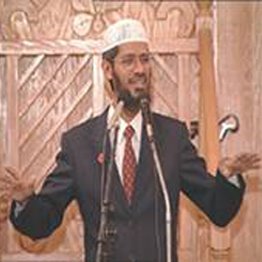
A medical doctor by degree, Dr. Zakir Naik is renowned as a dynamic international orator on Islam and Comparative Religion. Any Person who listens to his question and answers session is going to be astonished and overwhelmed as he clarifies Islamic viewpoints and clears misconceptions about Islam, using the Quran, authentic Hadith reciting each and giving each Surat, Ayat number (by heart) and he has not only learned Quran and Hadith by heart but has also learned several Bibles, the Talmud and the Torah (the Jewish scriptures), the Mahabharata and the Bhagvad Gita (the Hindu holy books), and other scriptures and gives very satisfying answer in conjunction with reason, logic and scientific facts. He has learned hundred and thousands of pages from different books by heart and has the knowledge of scientific and mathematical facts and theories. Dr. Zakir is popular for his critical analysis and convincing answers to challenging questions posed by audiences specially non-muslims, after his public lecture.
As an informational aside, the currently common Gregorian Calendar, was introduced only as late as 1582, by Pope Gregory. Russia adopted it as late as 1918 and countries in Europe adopted it at different periods, with Greece being the last to do so in 1923! Imagine the difficulties of communicating any dates to anyone in the intervening years. And for a bit of fun, try and guess the name of an imprtant person who was born on Oct 9, 1582 ...